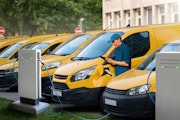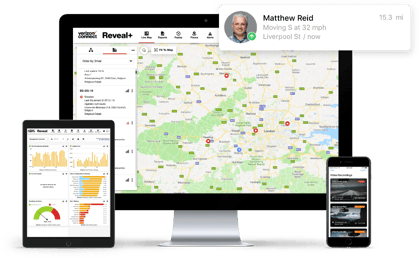9 Secrets to Reducing your Fleet Expenses
As a fleet owner, your day-to-day costs can quickly add up. What you don’t know is there are further hidden, expensive...
Read more
The issue of carbon emissions has arguably never been higher on the agenda. Businesses around the world are acutely aware of the need to operate in as green a manner as possible.
In the UK, the issue is perhaps in sharper focus. In 2016, the government unveiled its fifth carbon budget aimed at reducing emissions by 57% by 2030 on 1990 levels.
The country’s fleet businesses will have a large part to play in achieving this aim. When relying on transport for trade, emissions are a natural by product. And while it may not be easy to make significant reductions, there are steps that can be taken.
With the right tools in place, fleets can gain an element of control over their carbon footprint and take action to reduce emissions across the board. Here’s how:
As a general rule of thumb, the fewer miles you cover, the lower your carbon output. Of course, when running a fleet-reliant business, some miles are completely necessary. However, there are still ways to reduce your overall mileage.
Making use of a GPS tracking system to optimise your routing can help to improve your MPG, lower fuel consumption and reduce your carbon footprint. Using such systems to plan routes has been shown to lower overall fleet mileage by as much as 10%.
Speeding, harsh acceleration and late braking can all increase fuel consumption and, in turn, increase carbon emissions. By implementing a GPS system, you can track and flag such behaviours across your fleet to coach drivers into greener habits.
Assigning drivers a score based on their driving style is a great way to do this. The more economical their driving, the higher their score, and the higher they rank on the driver’s leaderboard.
Find the right solution for your business with our free Fleet Management Buyer’s Guide.
Unnecessary idling is a major contributor to carbon emissions. Just 10 minutes of idling releases around 1lb of carbon oxide into the atmosphere. Over the course of a week, month, or year across a busy fleet, that soon adds up.
By tracking instances of idling, you can make drivers aware of how their behaviours directly affect carbon emissions. With this in mind, you can then coach them into more economical driving practices.
Poorly maintained vehicles do not tend to operate efficiently. Routine servicing such oil and tyres changes and engine tuning can all increase fuel consumption and potentially increase the size of your carbon footprint.
GPS fleet management technology allows you to set regular maintenance reminders based on time, engine hours or mileage whenever routine servicing and repairs are due – helping you ensure your vehicle are always running at maximum efficiency.
Carbon emissions are a necessary evil of running a busy fleet. However, it is still possible to run a carbon neutral fleet business should you wish.
Once you’re satisfied that you’re doing all you can to bring your levels down as much as possible, you may wish to consider offsetting the rest.
By investing in projects that enhance and protect the environment, you can offset the emissions you create on a daily basis and further reduce your carbon footprint.
Verizon Connect’s GPS fleet management can help you to lower your carbon emissions while reducing costs and driving efficiency and productivity. Find out how.
Tags: All




Find out how our platform gives you the visibility you need to get more done.
As a fleet owner, your day-to-day costs can quickly add up. What you don’t know is there are further hidden, expensive...
Read moreVerizon Connect Reveal tracks the fleet data that can have a big impact on your business. These are things like where...
Read moreAt Verizon Connect, we can only provide the highest possible level of service to fleet managers and business owners by...
Read moreReveal tracks the fleet data that can have a big impact on your business. These are things like where your vehicles are...
Read more